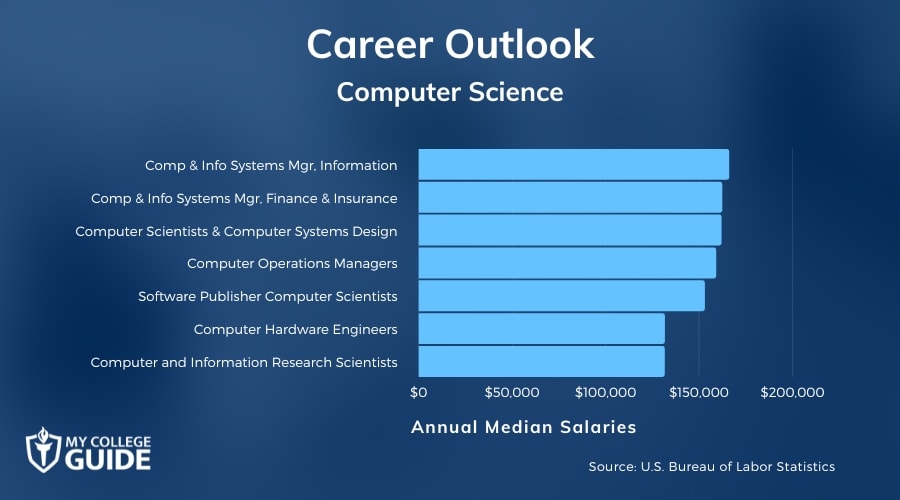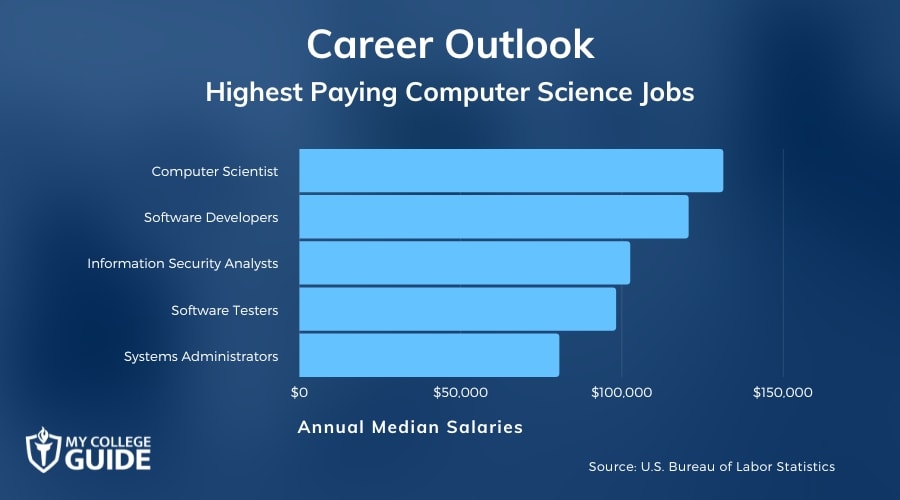If you are looking for a way to combine your technical skills with a passion for science and research, researching computer science careers may be a great step toward a lucrative, challenging career.

Throughout the course of your degree program, you will take classes that focus on the scientific aspects of computation to learn the essential skills needed to succeed in the modern workplace. Students who graduate with a computer science degree can find employment in a wide range of professional settings.
Editorial Listing ShortCode:
Whether they work for major corporations or governmental agencies, or as a researcher or developer, there is a number of exciting career ideas within this growing field.
What Can You Do With a Computer Science Degree?

Much like counseling careers and careers in communications, when it comes to computer science degrees, there are many career paths that graduates can choose from in the professional workforce.
With a greater focus on the scientific aspects of technology, those who have earned this degree are able to take on specialized roles within a variety of industries. As you can see from the information above, those who work in the field of Computer Science have the potential to work their way up to high-level management positions.
Editorial Listing ShortCode:
These opportunities also have the added bonus of average annual salaries that are well over six figures. While most graduates start their careers in entry-level computer science positions, the great potential for advancement within the field is excellent news for those with sought-after computer science skills.
10 Things You Can Do with a Degree in Computer Science
Computer science majors may be eligible for many different jobs in computers and information technology. According to the U.S. Bureau of Labor Statistics (BLS), computing and IT positions pay an average annual salary of $97,430.
1. Computer and Information Systems Managers

Projected Job Growth: 16%
Systems managers oversee computing departments in organizations. They usually have experience in networking, information security, or project management. The BLS says that the average salary for this job is $159,010. Potential job titles include information technology director and chief technology officer.
The responsibilities of a computer systems manager may include coordinating the work of various IT employees, planning upgrades, and overseeing expenditures.
2. Computer and Information Research Scientists

Projected Job Growth: 36%
Research scientists often work for the federal government, computing companies and research firms to develop advancements in computing technology. A master’s degree is usually required, and, according to the BLS, the job may pay around $131,490 annually.
Computer research scientists often work closely with engineers. Their efforts may contribute to advancements in hardware, software, or programming languages. Some research scientists specialize in robotics.
3. Computer Hardware Engineers

Projected Job Growth: 5%
Hardware engineers are involved in building computers’ physical components. Engineers often collaborate with software professionals so that they can develop chips and circuits that are compatible with programs. For this job, engineers may earn $128,170 annually.
In addition to coming up with new hardware designs, engineers may test products. When problems arise, they must investigate the cause and find solutions.
4. Software Developers

Projected Job Growth: 26%
Professionals in software development create programs for computers and other devices. There are multiple types of software developers, including app and game developers. On average, the BLS says that software developers make $120,730 per year.
Some software developers are responsible for programming the code for their software. In other organizations, they hand their designs over to computer programmers who then input the code.
5. Computer Network Architects

Projected Job Growth: 4%
IT architects take charge of the technology systems in an organization. They make sure that the organization has the best hardware and setup to meet its needs. This job commands an average annual salary of $120,520
Architects may build plans for an all-new computing system or perform upgrades and maintenance on existing systems. Security is a key consideration for network architects to keep in mind.
6. Information Security Analysts

Projected Job Growth: 35%
Information security analysts work in the field of cybersecurity. Their role is to protect data from hackers and other breaches of security. This is a job that may pay around $102,600 per year.
A security analyst might investigate a system for weaknesses that could allow someone to infiltrate. The role might also require coming up with response plans to use when a breach does happen.
7. Database Administrators

Projected Job Growth: 9%
Database administrators take care of responsibilities related to an organization’s data. They maintain the systems used for storing, organizing, and retrieving that data. According to the BLS, the role may pay around $101,000 each year.
To be successful in this job, administrators must understand programming languages and operating systems. In addition to doing administrative duties, they may also work as architects who build new databases.
8. Data Scientists

Projected Job Growth: 36%
Computer science students learn to work with data, and that background could be useful in a data science career. Working as a data scientist may pay about $100,910 annually.
Data scientists make data, including large sets of data, useful for research purposes. They analyze and evaluate the data to answer questions, solve problems and inform business decisions. They are often responsible for presenting their findings to professionals from other departments.
9. Computer Systems Analysts

Projected Job Growth: 9%
Computer systems analysts work with both hardware and software. Their role is to make sure that an organization is using the best technology to meet its needs. The job pays, on average, $99,270 per year.
Systems analysts are often consultants or contractors. They perform analyses to find places where tech could be streamlined or upgraded and make recommendations accordingly. Some specialize in systems analysis for particular industries.
10. Web Developers

Projected Job Growth: 30%
Web developers are professionals who program the code that drives the function and appearance of a website. According to figures from the BLS, they may earn around $77,030 each year.
Some web developers specialize in front-end tasks, and others handle back-end development. In addition to development, some people in this field work as webmasters who provide ongoing maintenance and support for a site. Additional careers in computer science include computer programmer, network support specialist, and health information technician.
Online Computer Science Degrees

Colleges offer computer science studies at various levels. You can earn just one degree or progress through successive levels of study.
- Associate’s in Computer Science: Often known as a two-year degree, this degree will introduce you to the basics of computer science. You’ll study programming language principles, algorithms, databases, software design, and operating systems. Earning an associate degree might prepare you to work as a computer help-desk technician or a network support specialist.
- Bachelor’s in Computer Science: Most people who study computer science at the undergraduate level earn a bachelor’s degree, which usually takes about four years. For this degree, you’ll study the same topics as you would for an associate degree and also go deeper with courses in full-stack development, mobile programming, and cybersecurity. This degree can prepare you for various entry-level technology jobs and may pave the way for future promotions.
- Master’s in Computer Science: Those who want to earn a graduate degree in computer science often start with a master’s degree. In a master’s program, you’d build on your undergraduate foundation in computer science. You might select a concentration in a subfield like robotics or cybersecurity. Master’s degrees may lead to leadership positions or qualify you to work as a computer research scientist.
- Doctorate in Computer Science: Doctoral degrees are the top level of study in this field. In a Ph.D. program, you’d probably complete specialized coursework and undertake an original research project. This degree could enhance your resume for some of the highest tech-related positions in large organizations. It could also prepare you for a job in research or academia. For example, you might get a job as a computer science professor.
Your level of education may influence which computer science degree careers are the right fit for you.
Computer Science Careers & Salaries

To give you a better understanding of the many different career options available in the field of computer science, we have put together a list of the top 40 computer science careers & salaries according to data from the U.S. Bureau of Labor Statistics (BLS):
| Careers | Annual Median Salaries |
| Computer and Information Systems Managers, Information | $165,940 |
| Computer and Information Systems Managers, Finance and Insurance | $162,240 |
| Computer Scientists, Computer Systems Design and Related Services | $161,870 |
| Computer Operations Managers | $159,010 |
| Software Publisher Computer Scientists | $152,940 |
| Computer Hardware Engineers, Computer and Peripheral Equipment Manufacturing | $131,560 |
| Computer and Information Research Scientists | $131,490 |
| Computer Hardware Designers | $128,170 |
| Computer Hardware Engineers, Semiconductor and Other Electronic Component Manufacturing | $127,690 |
| Operations Specialties Managers | $127,140 |
| Database Architects | $123,430 |
| Software Developers | $120,730 |
| Software Developers, Quality Assurance Analysts, and Testers | $109,020 |
| Information Security Analysts, Finance and Insurance | $104,790 |
| Information Security Analysts | $102,600 |
| Electrical Engineers | $100,420 |
| Computer Systems Analysts, Computer Systems Design and Related Services | $100,220 |
| Computer Systems Analysts | $99,270 |
| Software Programmers, Finance and Insurance | $99,260 |
| Engineers | $99,040 |
| Software Programmers, Manufacturing | $98,320 |
| Software Quality Assurance Analysts and Testers | $98,220 |
| Computer Systems Analysts, Information | $97,230 |
| Network and Computer Systems Administrator, Finance and Insurance | $96,860 |
| Database Administrators | $96,710 |
| Network and Computer Systems Administrators, Information | $94,980 |
| Computer Programmers | $93,000 |
| Software Quality Assurance Analysts, Administrative and Support Services | $86,060 |
| Network and Computer Systems Administrators | $80,600 |
| Computer Systems Analysts, Government | $80,040 |
| Computer Information Systems Professors | $77,910 |
| Computer Network Support Specialists, Telecommunications | $76,910 |
| Computer Network Support Specialists | $62,760 |
| Computer Network Support Specialists, Data Processing, Hosting, and Related Services | $62,460 |
| Computer Training Specialists | $61,570 |
| Electrical and Electronics Drafters | $61,510 |
| Computer Numerically Controlled Tool Programmers | $60,780 |
| Computer Repair Instructors | $59,840 |
| Computer User Support Specialists | $49,770 |
| Data Processing Equipment Repairers | $40,970 |
Due to the increasing demand for skilled technology professionals, the computer science career outlook is positive and growing.
With this in mind, the BLS projects that software developers will experience a job growth of 25% over the next decade, and web developers will see a 23% increase in this same timeframe. These numbers are well above the national average across all occupations and excellent news for those who are interested in starting a career within the field of computer science.
If you are interested in enrolling in a computer science degree program, the future is looking bright when it comes to your career potential. With the constantly changing technology, development of mobile applications, and an increasingly competitive business environment, organizations are always on the lookout for computer science professionals that can help them improve the efficiency of their computer systems and networking.
How to Know if a Career in Computer Science is Right for Me

Computer science studies are best suited to people with certain skills and interests.
- Commitment to Education: The more degrees and professional certifications you get, the further you may go in this field, so you’ll want to be a lifelong learner.
- Math Abilities: Computer scientists rely heavily on skills from advanced mathematics disciplines, such as linear algebra and calculus.
- Problem-Solving: You’ll continually be challenged with problems that need answers, so it’s helpful if brainstorming solutions is something you enjoy.
- Tech Savviness: If you’re a whiz with computers, then you may want to turn that interest into a lucrative career.
If computer science matches your skillset, then it could be a great way to earn a reliable salary.
Computer Science Licensure and Certifications

While a degree alone will meet the qualifications for many computer science degree jobs, certifications can be a valuable addition to your resume. Employers count on industry certifications as a way of knowing whether a candidate is truly prepared for the responsibilities of today’s information technology (IT) field.
There are many different certification programs available, and you can select yours based on your specialty area within computer science. It usually makes sense to start with broad certifications and then move on to more specialized ones. Examples of certifications include Certified Cloud Security Professional (CCSP) from (ISC)² and Cisco Certified Network Associate (CCNA) from Cisco.
Is Financial Aid Available?

Yes, you might receive financial assistance to help with your college costs. Computer science students should fill out the Free Application for Federal Student Aid (FAFSA) to learn more about funding opportunities.
You may receive both state and federal aid. Government loans are common for students at all levels, and undergraduates may receive grants as well. Scholarships and fellowships provide additional support for some students. These awards usually offer a sum of money that can go toward tuition, research projects, or educational trips.
Employers may put money toward schooling as well. You can check with your HR department about this benefit.
What Is a Computer Science Degree?

A computer science degree is a degree program that gives students an opportunity to delve into the theory behind computer programs and technological applications.
Instead of simply learning “how” these systems work, you will be taught to understand the “why” behind advancements in technology. This degree can be a good choice for those with a scientific mind that have aspirations to help businesses grow and evolve along with the changing technology of society.
Throughout your course of study, you will take several advanced technology courses that may cover the following topics:
- Data structures and analysis
- Computer systems and architecture
- In-depth training in a variety of software applications
- Networking
- Software engineering, analysis, and design
Once you have successfully earned your computer science degree, you may have the opportunity to take on professional roles within the technology department of businesses across several industries.
If you are a busy adult student that needs flexibility in your college course schedule, then you may want to consider the programs offering online computer science degrees that many universities now offer. These accredited programs provide a quality education for students that are working towards their degree while balancing professional careers and family obligations.
Is Computer Science a Hard Major?

Computer science students get ready for the workforce by studying topics related to computer hardware and software. That includes learning about programming languages, cybersecurity, data management, visualization, and algorithms.
Some students take multiple classes related to design and development. You may have to design your own apps, databases or websites during your studies. An internship may provide additional hands-on experience. In addition to technology-focused classes, students in computer science programs also need to know advanced math and science. The curriculum might include courses in physics, linear algebra, and discrete mathematics.
What Skills Do You Learn in Computer Science?

As you go through a degree program in computer science, you’ll develop employable skills to help you succeed in this field.
- Computer Programming: You will study fundamental programming concepts and may also become proficient in one or more programming languages.
- Data Management: Courses like Database Systems will teach you to build and maintain databases.
- Project Management: Through college assignments, you may prepare to see technology projects from beginning to end.
- Research: Knowing how to interpret data and read scientific literature can help you solve the computing problems you encounter.
These skills will prove useful in many of the top careers with a computer science degree.
Is Computer Science a Good Career Path?

Yes, computer science is a good career path for many professionals. People who graduate with a degree in computer science may have a wide variety of job opportunities available to them. That may include positions in database administration, network support, and software development.
There’s advancement potential in the IT field, too. According to the Bureau of Labor Statistics, computing management roles usually pay at least $95,220 each year. Some managers earn over $208,000. Computer science skills are needed in many industries. Your degree could lead to work in healthcare, education, business, finance, manufacturing, computing services, or another sector.
Where do Computer Science Majors Work?

As a computer science major, you might work for a technology-focused organization. Examples include being hired by a software development firm or a computer chip manufacturer.
Other industries need tech professionals as well. Many corporate enterprises hire people to maintain their databases, develop their websites or oversee their networks. Similar jobs may be available in government agencies, nonprofit organizations, healthcare systems, and schools.
Research careers in the information or data science could be another option. Colleges, development firms, and the federal government may hire for those roles. Some computer science graduates become consultants who are self-employed or work for consulting firms.
How Much Do Computer Science Majors Make?

Careers with a degree in computer science often lead to promising salaries, but the range can vary depending on the position.
For example, the BLS says that computer support specialists usually make between $38,560 and $102,410 annually. Web developers may earn $38,280 to $129,760. Network administrators average $80,600 per year, systems analysts make around $99,270 and network architects may see $120,520 salaries.
Jobs in management pay some of the highest wages. Managers in the information sector earn an annual average of $165,940. For those in enterprise management, the median salary is $161,630.
What Are the Highest Paying Computer Science Jobs?

Software developers, architects, and engineers earn high computer science salaries. According to the BLS, here are some of the highest-paying computer science jobs and their annual median salaries:
- Computer Scientist: $131,490
- Software Developers: $120,730
- Information Security Analysts:$102,600
- Software Testers: $98,220
- Systems Administrators: $80,600
Jobs related to UNIX systems may be especially lucrative as well.
What’s the Difference Between Computer Science vs. Information Technology?
For a career that deals with cutting-edge technology, you could study computer science or information technology (IT).
| Computer Science | Information Technology |
|
|
A computer science degree will qualify you for many jobs in IT as well.
What’s the Difference Between Computer Engineering vs. Computer Science?
Either computer engineering studies or computer science coursework could prepare you to work in the computing industry, but each degree program has a slightly different focus.
| Computer Engineering | Computer Science |
|
|
Whichever you study in college, you’ll acquire in-demand skills.
Is a Computer Science Degree Worth It?

Yes, a computer science degree is worth it for many professionals. Computers are the backbone of most organizations, no matter what industry they’re in. As such, jobs for trained computing professionals are plentiful.
Plus, the BLS predicts that openings in computers and information technology will grow by 15% over the next 10 years. Certain jobs are seeing even higher growth. Examples include software development, web development, and data science, which are all highly relevant to a computer science degree.
Getting Your Computer Science Degree Online

Computer science is an exciting field with diverse career opportunities. Professionals in computer science play an essential role in modern organizations.
Whether you want to conduct cutting-edge research, keep companies’ IT running smoothly, or develop new software, a degree in computer science could help you achieve your goals. For scheduling freedom that suits your busy lifestyle, earn your computer science degree online. Choose an accredited school, and you can count on receiving a quality online education.
Considering how flexible online college can be, now might be the time to earn your degree. Start checking out computer science schools today.
